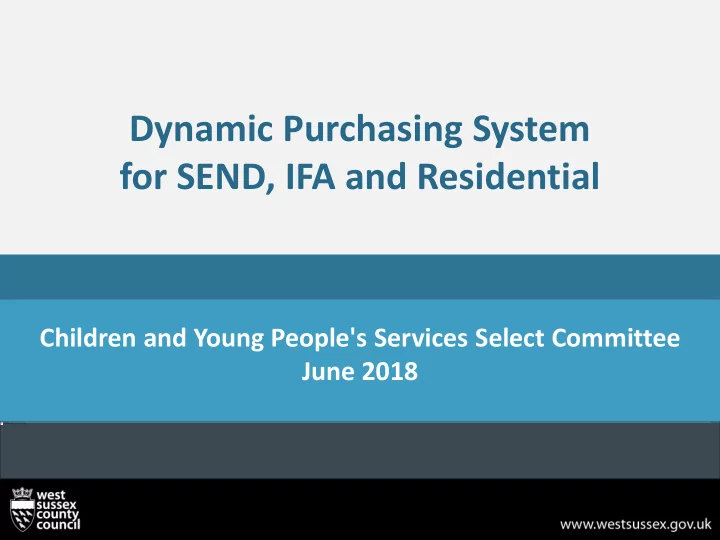

Dynamic Purchasing System for SEND, IFA and Residential Children and Young People's Services Select Committee June 2018
What’s the problem? • To meet demand, we have a statutory requirement to secure external residential placements for children with Special Educational Needs and Disability (SEND) and for Children Looked After (CLA). • We buy SEND day placements, SEND residential placements, Independent Fostering Agency (IFA) placements and residential CLA placements.
What do we currently buy? As of June 443 students in Of the 65 Agency Independent and Non- Residential placements, 2018, we Maintained Special School 29 are within West Sussex (INMSS) placements in 68 place… and 36 are out of county schools Of the 443 INMSS 65 Agency placements, 64 are Residential residential placements (Children’s Home) and 379 are day placements for CLA placements 264 of the 443 INMSS 3 IFA Parent & Child placements are within Placements (all West Sussex, and 179 within West Sussex) are placed out of county Of the 148 IFA 148 Independent placements, 100 are Fostering Agency within West Sussex and placements for CLA 48 are out of county
What does it currently cost? As of June Of the £45.2 million total INMSS residential spend, £23.2 million on placements cost from 2018, this SEND placements and £22 £27,000 to £290,000 million on Social Care costs… per year placements INMSS day Total spend of £45.2 placements cost from million per year on £9,450 to £84,000 per SEND, IFA and Agency year Residential placements Average (median) cost IFA placements cost of Agency Residential from £331 to £1,925 placements is £3,778 per week ( £17k - per week ( £200k per £100k per year) year) Agency Residential Average (median) cost placements cost from of IFA placements is £2,131 to £7,900 per £769 per week ( £40k week ( £110k - £410k per year) per year)
What will demand look like in future? • The child (0-17) population is currently growing; latest projections released by the ONS predict an increase of almost 2,000 children from 2018 to 2019, more than 2,000 from 2019 to 2020 and then more than 1,000 per year for the next three years after that. • West Sussex currently has a ‘bulge’ in the child population between the ages of 5 and 10 years. Over the next 5 years these children will reach the ages of 10-15; the majority of our agency residential placements are children aged 10-15.
What will demand look like in future? • The chart below shows the effects of population growth alone on potential placement numbers. If rates of children in INMSS, IFA and Agency Residential placements per 10,000 children in the population were to remain static, we would see an additional 8 placements in 2019 (of which 5 would be INMSS placements), another 8 in 2020, six in 2021 and four each in 2022 and 2023.
How do we currently buy? • We purchase via an assortment of frameworks, with spot purchases made outside of these frameworks also. The various frameworks cover different categories of placement, and all have different memberships. There are also some frameworks within the South East region that we are not part of. The South London Alliance is a multi-category DPS covering SEND, fostering and residential (only SEND is live, other categories to follow in 2019). London Care Placements: London Boroughs plus Oxfordshire, Bucks, South London Alliance Milton Keynes (SEND): Bexley, Southern Region Children’s Bromley, Croydon, West London Greenwich, Kingston, Alliance: 6 Commissioning (South Lewisham, Merton, authorities Central/Southampton led Richmond, Sutton, Wandsworth procurement): Undecided strategy (SEND): Bournemouth, Slough, Isle of Wight, Kent, Brighton & Current Partners: Oxfordshire, Poole, Portsmouth, Hove South Central Brighton & Hove for Southampton, Surrey, Reading, Fostering Framework: fostering and PIN Notice & Windsor & Maidenhead, West West Sussex is not a residential CLA, Spot Berkshire, Wokingham, East Sussex, part of this framework Placements potentially East Sussex (SEND): East Brighton & Hove, Dorset, Medway, and Kent in future Sussex Bracknell and West Sussex
Risks – Availability of placements • There are currently 355 children placed by other LAs in West Sussex, including 78 in residential placements. Brighton & Hove are the top authority placing in West Sussex (93), followed by Surrey (64) and Hampshire (46). The total of 9,910 CLA in London places significant pressure on residential placements across the whole of the South East. • Similarly for INMSS placements, there are over 3,000 such placements made by London Authorities, far CLA placed in West Sussex by other LAs, Jun 2018 exceeding the capacity of INMSS schools in London and placing pressure on the surrounding authorities. Pupils with EHCP/SEN Statement in INMSS placements, Jan 2018 Total CLA, Mar 2017
Risks – Affordability of placements • West Sussex currently has predominantly maintained low unit costs for residential CLA placements; however there is a risk that they could increase. • For example; our current framework unit costs for residential CLA placements are lower than Hampshire, Surrey, East Sussex and London Borough’s.
What is a Dynamic Purchasing System? • An entirely electronic process for purchasing commonly used services, usually divided into categories; in this case, placements for Children Looked After or children with Special Educational Needs & Disability. • Differs from existing electronic frameworks in that suppliers can join at any time . • Joining is free, with no limit on the number of suppliers who may join. All suppliers meeting selection criteria must be allowed to join. • WSCC sends out invitations to tender via the DPS. Any supplier may choose to submit a tender in response. Bids are then evaluated and the winning contract(s) are awarded.
What are the benefits of a DPS? • Allows new suppliers to join at any time. • Gives suppliers the ability to joint venture. • Facilitates specialist provision. • Allows greater influence over unit costs. • Allows block purchasing.
When will it happen? • Mobilised by February 2019
Recommend
More recommend